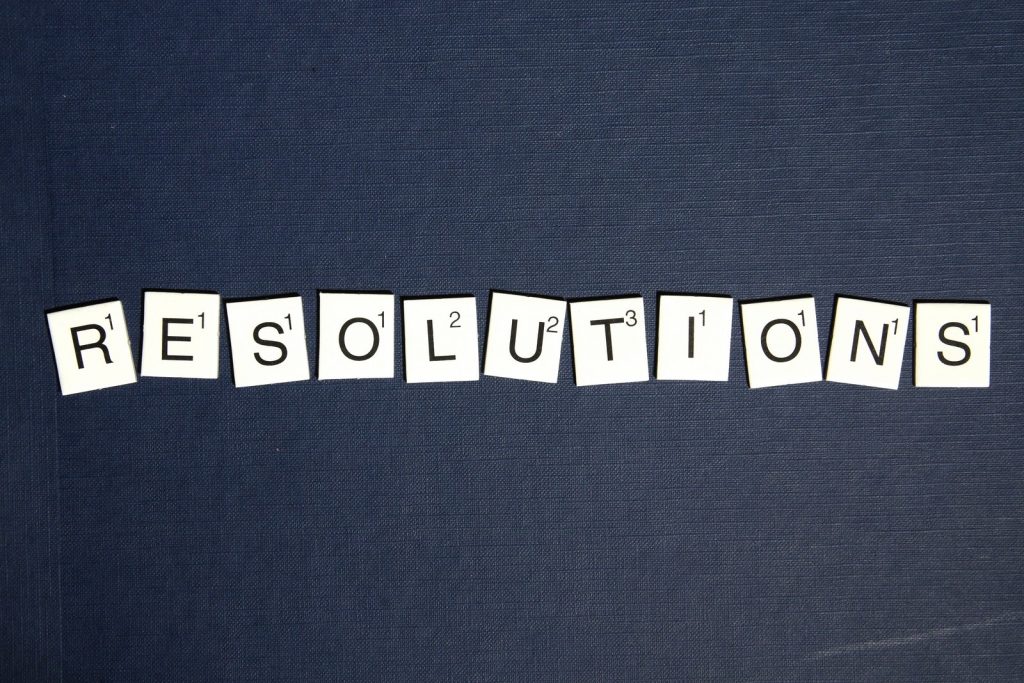As the 2021 New Year approaches, Americans will set a resolution to eat healthier or lose weight. Here are some tips to help the resolution last all year long.

With every New Year comes a fresh start, and an opportunity to reflect on areas of growth. According to a recent poll on finder.com, an estimated 188.9 million American adults (approximately 74% of the population) have admitted they will set a 2021 New Year’s resolution. Approximately 45% of those claim to be setting a health related resolution, such as weight loss or diet changes. But sadly, according to Psychology Today, an estimated 40% of resolutions fail by March and only 10% of people on average keep their resolutions until the following December.
How to Make a Strong Resolution

Luckily there are some tips and tricks to help you keep your New Year’s Resolution. The first thing to do is make sure you are setting a resolution that is actually destined for success. Instead of setting lofty, unattainable goals that would set you up for failure (like trying to lose too much weight in too short of a time), sitting down and analyzing why a goal is being set and writing out steps to succeed can help minimize chances that the goal will fail shortly into the New Year. In goal setting, the acronym S.M.A.R.T. can be extremely helpful:
Specific: Is the goal specific, well defined, clear and unambiguous?
Measurable: Set criteria to help measure progress towards the accomplishment of the goal
Achievable: Make sure the goal is attainable and not impossible to achieve
Realistic: The goal is within reach, realistic and relevant
Timely: The goal needs to have a clearly defined timeline, including a start date and target end date. [Retrieved from corporatefinanceinstitute.com]
If your New Year’s resolution in 2021 is to “lose more weight”, breaking it into a S.M.A.R.T goal would be to break it down into smaller subgoals, such as 1 to 2 pounds per week. If you need to lose 20 pounds, your time limit on the goal needs to fit within healthy guidelines for weight loss. So your goal should be to lose 20 pounds by April-May if you begin the first week of January. The SureFiz scale and program helps to break down weight loss goals into smaller subgoals that help you attain the overall weight loss goal more efficiently. It takes the guesswork out of weight loss for you! Be sure you are using the app to help aid you as you set your New Year’s resolutions.
Tips for Long-term success

Another way to ensure you can achieve long-term success with your weight loss resolution is to look at possible obstacles you will face. If your goal is to eat less sugar, but you have a weekly meeting where donuts are offered, you want to find ways to overcome this obstacle before it is facing you. An example of how to handle this could be to either make sure you have eaten before the weekly meeting and aren’t hungry, or sit as far away from the donuts as possible, or even bring a healthy snack option for yourself if you feel the need to eat something. Substituting a healthier habit for your current habit is a strong, proven method to successful behavior modification, according to Psychology Today.
A common obstacle in behavior change and goal setting is what we do when we fail. A few missteps are to be expected on a weight loss journey, such as eating the donut or a piece of pizza. Studies of behavior modification show that our self-talk and self-stories can be extremely powerful motivators in whether we see long-term success (Source: nbcwashington). If you eat the donut or the pizza and then tell yourself you are a failure and can’t stick to the diet plan, then you are much more likely to fail. SureFiz trainer Jenn Ryan recommends preparing ahead of time for small failures and having a positive self-talk response ready to combat any negative feelings. If you are more likely to think you cannot accomplish a goal, then you will most definitely quit at the first sign of challenge. Be ready for these moments with positive reinforcement. An example would be, “One donut won’t ruin my diet. I can start fresh with my healthy lunch and get right back on track. I can do this!” Preparing a positive response before you are faced with your challenging situation will ensure that you actually respond positively and can pivot quickly to get back on course.
New Years resolutions may be tough to keep, but they are not impossible. When it comes to weight loss and diet help, SureFiz is the best tool to help you not only lose the weight but keep it off for good. We can help you be one of the 10-20% of the population who keeps their resolution by the end of 2021. Be sure to check out our website for more diet tips, healthy recipes and weight loss inspiration to keep you motivated throughout the entire year.






